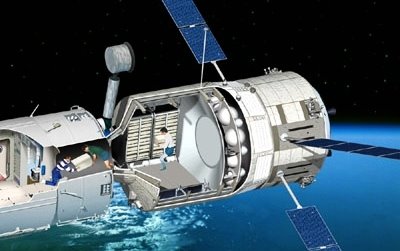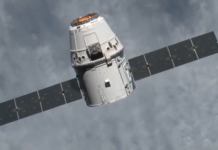 What goes up must come down. In just a few days, the 9.4-ton space station Tiangong-1, or “Heavenly Palace,” is scheduled to fall out of orbit. The Tiangong-1 will reenter Earth’s atmosphere, break up, and scatter debris. It’s unlikely that any pieces will hit any land or people.
What goes up must come down. In just a few days, the 9.4-ton space station Tiangong-1, or “Heavenly Palace,” is scheduled to fall out of orbit. The Tiangong-1 will reenter Earth’s atmosphere, break up, and scatter debris. It’s unlikely that any pieces will hit any land or people.
The spacecraft was first launched by China in 2011 and served as a two-room home in space to astronauts until 2013. At that point, China retired the station and left it to orbit Earth. In March 2016, China lost contact with the Tiangong-1 and was no longer able to control the craft.
While it was operational, the Tiangong-1 circled the planet 250 miles above the surface at speeds of about 17,500 miles per hour. It made a full orbit of the Earth every hour and a half. Now that the craft is no longer receiving signals from China, it has slowed down, and soon will begin its fall to Earth.
Once the Tiangong-1 falls low enough to encounter the atmosphere, one of two things can happen. Either the craft can bounce off the atmosphere, or push straight through. If it does push through the atmosphere, it will break up and the debris will be scattered over a large area.
The nonprofit company Aerospace Corp., which conducts research into spaceflight, predicts that the Tiangong-1 will hit on or around April 1. However, it’s impossible to predict where any chunks of the station will land or what condition they will be in.
Given that more than two-thirds of the Earth’s surface is water, it’s likely that any debris will crash harmlessly into an ocean. In fact, it’s been estimated that any individual is a million times more likely to win the lottery than to be pelted by a piece of the spacecraft. In the entire history of space exploration, there’s only been one recorded incident of a human being hit by space debris. It was a woman in Oklahoma whose shoulder was brushed by a piece of space junk, and she was just fine.
The unlikely odds aren’t stopping some folks from hoping to find a souvenir of the station. Some people have even speculated that complete items of gear, especially those made of titanium, could reach Earth intact.




